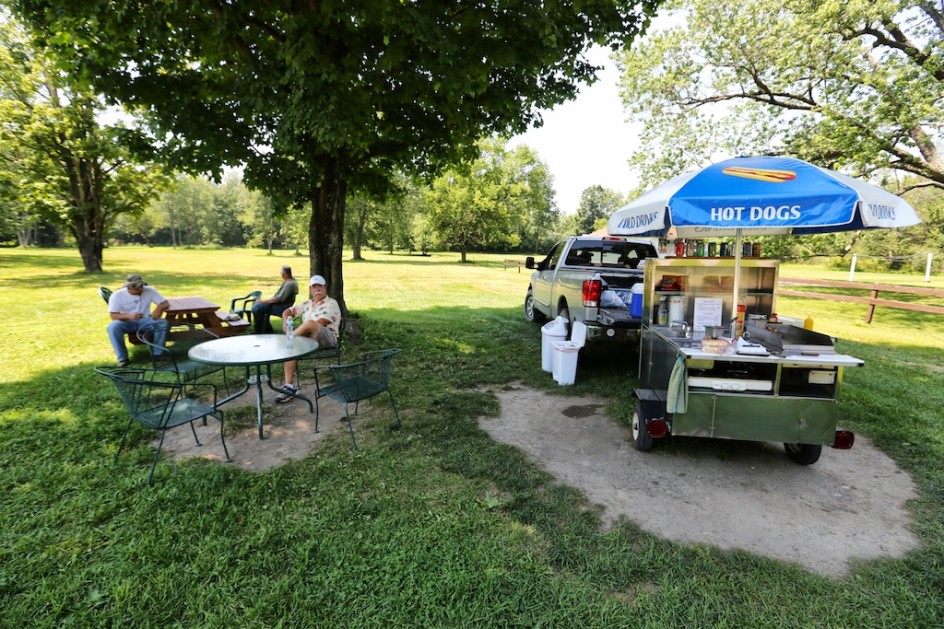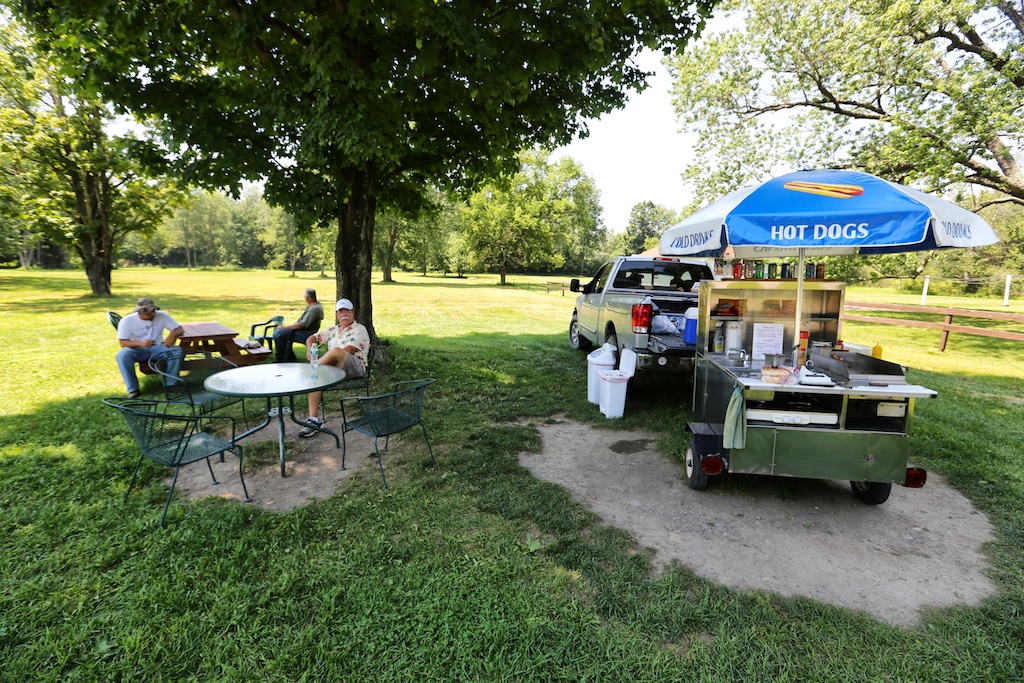
I’m beginning a regular column on rural life, this is the first. It will appear weekly at least.
Bob Dupuis has a restaurant in Cambridge, N.Y., it is not a franchise, he can sell whatever he is licensed to sell, he has no employees, no ventilation or waste disposal issues, he will never get reviewed by the New York Times restaurant critic. In the warm weather months, he pulls his truck and cart onto a stretch of lawn along Route 22, pulls out his umbrella, sets up his chairs and receives a steady stream of visitors and luncheon goers.
It seems that half of the customers are Bob’s buddies coming by to chat for a bit, get some shade and take a break from work. he is not hurried, he is always happy to talk. He is known to keep up a running commentary on the world from his small patch of land. When I thought of writing my first column on rural life, Bob came readily to my mind, I drive by him several times a day, and from about 11 to 2 p.m., he is busy. Truckers stop by for lunch, cops, local residents, vacationers. It is as comfortable and informal a setting as you can get and it speaks to what is valued in rural life and what was lost for so much of American when the political and economic theorists of the country decided to abandon a way of life and a vast territory for the greedy lure of the new global economy. With the hot dogs and soda comes Bob’s philosophy, he has a lot of friends. On weekends, he brings his cart to weddings, markets and auctions.
Bob has chosen a way to be as well as a thing to do. And rural life is still as much about a way to be as a place to live. Rural life still permits that, even thought the idea has generally vanished from an urban/suburban population panicked by health care, retirement and housing costs.
I don’t know Bob well and I haven’t discussed finances with him, but it’s a safe bet to assume Bob isn’t living for security, doesn’t have a fat IRA and will not be retiring to Florida, unless he is selling a lot more hot dogs than I might have guessed. I know a lot of people like Bob up here. When the government decided that rural life and farming were inefficient in the new economic order, people, jobs and money left the countryside, more than 90 per cent of Americans now live in cities. The people of rural American were heartbroken to see their children forced out of the country and into a different way of life. Economists are the new power brokers of the world, and it was decided that preserving rural life was not efficient. The children of the countryside have followed mostly bad jobs to the overcrowded cities, where Bob Dupuis could not last a day.
If they talked to these children, they almost all say the same thing. They couldn’t wait to leave, they wish they could find a way to return.
In the country, it is still possible to do what you love. We are not yet burdened by so many things we need to have and can’t afford to buy. This was a major reason I came to live in a rural area, I had a farm with acres in the woods, barns and plenty of room for less money than it costs to rent a one-bedroom apartment in Brooklyn or Northern New Jersey. It isn’t just a matter of money for me, it is a question of freedom. I can live as a writer, do my work, take my pictures, all around me are people who have come here and stayed here to do the same thing, from handyman to artists. If I had not come here, it is hard to imagine I would still be a writer today.
Bob Dupuis works hard and I am sure his life and work is not easy, but he is a symbol to me of what American was created to be and was meant to be – a country of opportunity, and the opportunity isn’t just about getting rich, but about the chance to pursue the life you want, the things you love. A life that wasn’t about health care or retirement costs but about the freedom to chase a dream. There is a man down the road who has a CD store in an old and seemingly abandoned barn and I have never seen anyone come in or out of his store, but he loves his music, will talk about his CD’s all day to anybody who wanders in.
Another neighbor, Moon, is a musician, he works at Momma’s restaurant, plays the guitar in Saratoga in the summer and does small gigs in bars and clubs around here and in Vermont. He loves music, he is following his bliss, you will probably not ever hear of him but he loves his life and is doing what he loves. I think of the hermit up the road who lives in a one room hut, has no car (he rides a bike around), heats with the wood he chops, and just asks to be left alone to tend his house and small plot. He is left alone.
I think of the electrician who structures his work so that he can take November off to hunt and spend time in the woods. And of my friend Ben, the handyman, who will never leave here because he understands the importance of living on a scale he can afford and that offers him the freedom to do the work he wants.
I love rural life but I do not romanticize it. It is tough here, there is little regular work, grinding poverty, a lot of drinking and despair. The men do odd jobs, work for the second homers, the women find steady jobs in health care – as nurses or nursing home workers – and get some benefits. Some of those trailers and sheds off of the major roads seem more out of the Great Depression than modern times. Still, it is a place of beauty, of opportunity in its own way, of promise. People are open, friendly, trusting. To be a neighbor is a responsibility, not just a name. Thoreau could not survive in most of America, he would be shut down by regulators or bankrupted by costs and safety rules.
But he could still find a Walden Pond in rural America, still go there, still be left alone to pursue his dream and live his life. This is what Bob Dupuis means to me when I think of rural life, he is a symbol of promise and freedom, he reminds me why my grandparents risked their lives to come here, that spirit lives and endures, far from the crowded urban corridors, the economists in their towers, the angry men and women arguing on cable news.

